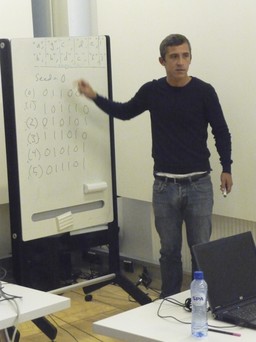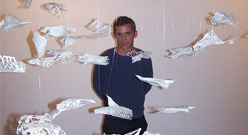-
- 06 SepInterview Chris Kievid & Jelle Feringa in B-Nieuws #1 on Hyperbody's recent focus on Robotic Fabrication
- 16 AugHyperbody PhD candidate Alireza Hakak won the first prize in an open design competition
- 03 AugHenriette Bier and Christian Friedrich members of the reviewing committee for: Rethinking the Human in Technology-Driven Architecture
- 30 JulPublication "Architecture as a Multi-Agent System" by Tomasz Jaskiewicz in Volume #28: Internet of Things
- 28 JulInterview Kas Oosterhuis on Process, Timelessness and RealTime in Architecture
- 19 JulPaper presentation Xin Xia at the ENHSA/EAAE Conference - Rethinking the Human in Technology-Driven Architecture
- 12 JulTEDxDelft will feature Kas Oosterhuis as speaker — Ideas spreading everywhere
- 01 JulURBAN FLUX workshop @ Harbin Institute of Technology : 25th June - 9th July 2011
- 29 JunDr. Henriette Bier will be presenting her paper "Robotic Environments" at ISARC 2011
- 27 JunLecture and paper by Alireza Mahdizadeh Hakak and Nimish Biloria @ iVERG Conference
-
-

The speaker and workshop conductor is Peter Macapia ( Adjunct Assistant Professor Pratt Institute / Sci-Arc ). Peter Macapia established DORA

- Published participants : Leander Rispens Aerium, Breta Bishop, Carlo Maria Morsiani Cave, Lieneke van Hoek, Gerben Modderman, Foteini Setaki, Matas Ubarevicius, Ferdi Zoet
Workshop brief
In the workshop Peter Macapia will show the larger scope of the combinatorial aggregate studies and their implication for architecture and design.
Playing with fire
This workshop is oriented toward a problem both simple and complex: what if we were to design not with geometry, but that which precedes geometry? What if we were to design with combinations rather than forms? What if we were to design with a given that appears nonsensical? What if we were to design blindly? In other words: what if we were to design with computation in the strict sense of that term?
This workshop is both a philosophical inquiry into the problem of computation against the background of geometry and the tradition of architecture as well as an exploration of what constitutes an architectural problem in the milieu of emerging computational techniques. We will use a couple of programs to look at and to develop aggregates out of geometrical primitives and study their results, divine their architectural potential, and organize our thoughts towards another horizon that is looming beyond the geometrical language of mathematical physics.Or, if one prefers, the participants will play with fire. The results will either lead us into new architectural understandings or it will lead us into an awareness for the demand for new architectural problems.
 Facebook/
Facebook/
 Twitter/
Twitter/
 RSS
RSS

